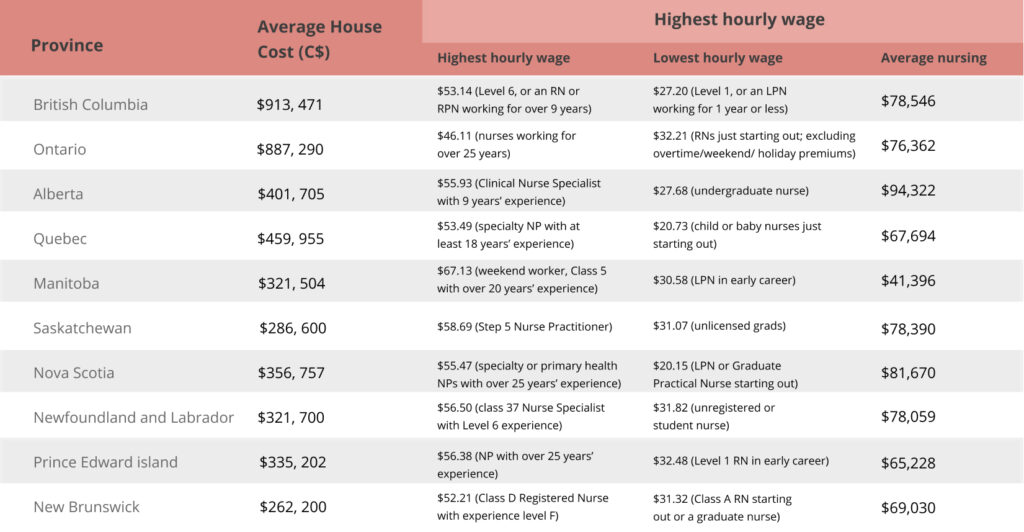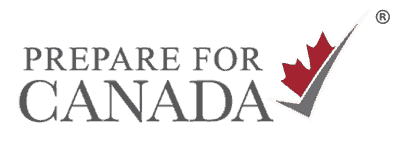
Nursing is among the most in-demand jobs in Canada due to a labour shortage. And this shortage is expected to persist. There are ample opportunities for newcomers to work in nursing in cities across the county. Registered nurses (RNs) play a vital role in Canada’s health care system. While the pandemic created an urgent need, the demand for RNs stems from Canada’s ageing population which will require more health services. The increasing demand is also affected by nurses who are retiring from the workforce.
As a result, more nursing jobs are available in Canada. Because of these factors, internationally educated nurses (IENs) will play a vital role in filling the nursing job gap. In addition to nursing jobs in hospitals, there are many other settings for RNs such as clinics, rehabilitation centres, nursing homes, and private residences.
For registered nurses and registered psychiatric nurses, over the period 2019-2028, new job openings (arising from expansion demand and replacement demand) are expected to total 191,100, while 154,600 new job seekers (arising from school leavers, immigration and mobility) are expected to be available to fill them.
CANADIAN OCCUPATIONAL PROJECTIONS SYSTEM
It’s vital to research nursing jobs and employment requirements before you arrive in Canada. Even within a great job market, it can be difficult to secure a job without the required credentials and licensing to work in this regulated profession in Canada. Knowing what’s required to work as a nurse in Canada before you arrive can save you time, money, and energy.
Advertisement:
If you’re interested in a career as a registered nurse (RN), find out about nursing employment and job requirements in Canada. If you were trained as a nurse and have nursing experience, you may have many of the requirements.
Contents:
- How to Immigrate to Canada as a Nurse
- An Overview of the Application Process for IENs
- After You Receive Your NNAS Advisory Report
- Apply to Provincial and Territorial Nursing Regulators
- What to Expect When Pursuing a Nursing Career in Canada
- Registration Requirements for IENs to Become a Nurse in Canada
- Credential Assessments
- Education & Bridging Programs for Nurses
- How to Become a Registered Nurse in Canada
- How to Become a Travel Nurse in Canada
- Can You Become a Nurse in Canada in 6-12 Months?
- Pursuing a Nursing Career in Canada
- How to Find Your First Canadian Nursing Job
How to Immigrate to Canada as a Nurse
Canada welcomes IENs, but there is a specific process to follow to immigrate to Canada to work as a nurse. You must first apply to the National Nursing Assessment Service (NNAS) and submit documents that will allow you to register as a nurse in Canada. The NNAS is a national online application service developed by nursing regulatory bodies in Canada.
The role of NNAS is to:
- Receive and store documents that IENs submit
- Verify that documents are real
- Ensure credentials meet Canadian standards
- Confirm that they have all application documents
- Send an Advisory Report to the provincial nursing regulatory bodies.
The Advisory Report will allow you to apply to any province and nursing group including Registered Nurse, Licensed Practical Nurse, and Registered Psychiatric Nurse. The NNAS has a helpful step-by-step applicant handbook to guide you through the process.
Applying to the NNAS is an essential first step because you can only work in Canada if you have an NNAS account. Once you set up your NNAS account, submit all relevant documents, and complete your file. The NNAS will evaluate your file and provide you with access to an Advisory Report
CANADIAN OCCUPATIONAL PROJECTION SYSTEM
Advertisement:
An Overview of the Application Process for IENs
All IENs are required to complete the NNAS 6-Step Application Process. Here is what you need to do:
1. Create your online account to start your application
2. Submit two forms of identification
Submit a passport, driver’s licence, or government-issued identification directly to NNAS. Your ID must be copies of original documents and you must:
- Sign and date all copies
- Have a notary stamp your ID to confirm that they have seen the original documents
- Provide documents that have been translated by a certified translator in either English or French.
3. Submit your Nursing Education form
You need to do this for each post-secondary school you attended outside of Canada. Each school must complete the form and send it directly to NNAS.
4. Submit your Nursing Registration form.
You must print, sign, date, and send the form to all nursing licensing authorities where you were licensed outside of Canada. The licensing authority must send the form directly to NNAS.
5. Submit your Nursing Practice/Employment form.
You must print, sign, date, and the form to all employers that you have worked for in the past five years. Employers must send the form directly to NNAS.
6. Submit your Language Testing results.
You must prove to the NNAS that you can communicate effectively in English or French. You are required to complete language testing if your first language is not English or French.
If you require an English or French language test, the following are approved testing agencies:
- International English Language Testing System (IELTS)
- Canadian English Language Benchmark Assessment for Nurses (CELBAN)
- Test d’évaluation de français (TEF)
These agencies evaluate your listening, writing, reading, and speaking skills. All Canadian nursing regulators will require proof of your language ability.
A Note About Language Testing
You don’t have to complete language testing if your first language is either English or French. However, you will have to prove that English or French is the main language used where you live and work. As well, you will have to show that you received your nursing education in English or French. You will also need to show that you have practiced nursing within the last two years where English or French was the main language used.
After You Receive Your NNAS Advisory Report
When you receive your NNAS Advisory Report, you can apply to the nursing regulators in the province where you expect to live.

Apply to Provincial and Territorial Nursing Regulators
It is up to the provincial or territorial regulators to assess your nursing competency. To do this, you will have to go through an assessment process and:
- Complete required exams
- Show knowledge of laws, regulations, standards, and guidelines set by the provincial nursing regulators.
What to Expect When Pursuing a Nursing Career in Canada
Nursing is among the most in-demand professions across Canada and job prospects are rated as good in many provinces. If you have the credentials and desire to work in nursing in Canada, you will have options in terms of location, specialization, and type of employer.
There is a demand for RNs with skills and experience in specialty areas, such as emergency, critical care, and operating room, and those who are willing to work in smaller or isolated communities.
In Canada, RNs work in traditional and specialized healthcare settings or in other community settings such as hospitals, nursing homes, extended-care facilities, community health agencies, health centers, and walk-in clinics. Nurses may also be self-employed. There is a movement toward community-based health care, so in the future, there may be fewer jobs in hospitals and more in public health areas.
You can visit Canada’s Best Diversity Employers website. This special designation recognizes Canada’s best employers for workplace diversity, inclusion, and equity. You can use this site to search for healthcare employers that you may be interested in working for.
Registration Requirements for IENs to Become a Nurse in Canada
One of the first things you need to do is learn what you require to work as an RN in Canada. To do this you can visit the provincial or territorial nursing regulatory body (where you intend to settle in Canada (see section 5: Provincial & Territorial Regulatory Bodies). You can find information about the documents you will require along with assessment fees. It’s important to take this step before you arrive in Canada so you have a clear understanding of the time and cost to apply.
Internationally educated nurses must possess a General Certificate of Registration to work as an RN or Registered Practical Nurse (RPN) in Canada. You will have to provide proof of the following to be eligible to register:
- Proof of Canadian citizenship: This also includes Permanent Residency or authorization to work in Canada.
- Completion of a nursing program: It must be equivalent to a 4-year bachelor’s degree in nursing or a practical nursing diploma.
- Evidence of nursing practice: This is in the category for which the IEN is applying within the 3 years prior to issuance of a Certificate of Registration.
- Successful completion of the NCLEX-RN: This is for those applying for RN. Completion of the Canadian Practical Nurse Registration Exam (CPNRE) for those applying for RPN. Also completion of the RN/RPN Jurisprudence Examination.
- Language proficiency: Evidence of language proficiency in either English or French.
You will also have to report past offences, findings, and other specified matters and meet College requirements related to health and conduct.
Your provincial regulator will determine if you need to take additional steps. For example, registration requirements may vary if you live in Ontario than if you live in Alberta or British Columbia.
Credential Assessments
You will require an education evaluation to see if your education in your home country is equivalent to Canadian nursing education. You may need to show your knowledge and skills through a competency-based assessment.
The nursing regulatory bodies in each province and territory are responsible for assessing the qualifications of IENs. They also schedule nurses to write the Canadian Registered Nurse Examination (CRNE). You cannot write the exam outside Canada.
For other organizations that provide credential evaluation, assessment, and qualification recognition services click here.
Education & Bridging Programs for Nurses
In addition to accreditation, upgrading your skills through a bridging program is an important part of your journey to becoming a nurse in Canada. Completing a bridging program ensures you have the proper knowledge to practice nursing in Canada and meet the required standards of care.
Bridging programs are a good way to transition your international experience and training to the Canadian workplace. Many colleges, universities, and immigrant-serving agencies offer bridging programs for nurses. You can research various bridging programs to see if you’re eligible for a program that meets your needs.
| Province | Bridging Program |
|---|---|
| Ontario | York University Post-RN Internationally Educated Nurses BScN Program |
| Ontario | Mohawk College Internationally Educated Nurses (IEN) Competency Upgrade Pathway |
| Ontario | Centennial College Practical Nursing for Internationally Educated Nurses (Fast-Track) |
| Ontario | CARE Centre for IENs |
| Ontario | George Brown College Nursing for Internationally Educated Nurses |
| Alberta | Bredin Centre for Career Advancement Alberta Registered Nurses Assessment Program Preparation |
| Alberta | Mount Royal University Bridge to Canadian Nursing |
| British Columbia | Kwantlen Polytechnic University Graduate Nurse, Internationally Educated Re-entry Certificate |
| British Columbia | OMNI College Canadian Nursing Review Program for IENs |
| Manitoba | Red River College Nurse Re-Entry |
How to Become a Registered Nurse in Canada
If you are a new immigrant to Canada and have an interest in becoming a nurse, there are a number of steps you will have to complete. These steps are similar to applying to become a nurse as an IEN:
- Enroll in a nursing program in Canada: Choose a nursing school in your province. Select the appropriate program based on the type of nurse you want to become.
- Apply to the College of Nurses in your province: For example, if you plan to practice nursing in Ontario you’ll need to register with the College of Nurses of Ontario. This step also involves you completing the registration exam and the RN Jurisprudence Exam.
- Fulfill additional requirements: Once you pass the exam requirements, you must show proof of fluency in English or French, show proof of citizenship, Permanent Residency, or authorization under the Immigration and Refugee Protection Act (Canada), and eligibility for registration in the jurisdiction where a nursing program was completed.
- Become a Nurse Practitioner (NP): If you plan to become a nurse practitioner, you’ll need to complete additional education. To become an NP you will need to complete the Nurse Practitioner graduate program and pass the approved registration exam.
How to Become a Travel Nurse in Canada
A travel nurse is an RN who works for an independent staffing agency. They are assigned to different care areas temporarily and move around to new locations frequently. It’s a specialized type of nursing that evolved out of the shortage of qualified nurses in Canada.
Working as a travel nurse is an appealing option because of the benefits it offers, including:
- Working in new locations and organizations
- Choosing where you work and for how long
- Creating your own flexible schedule based on your lifestyle
- Experience new opportunities at each place you visit.
To qualify to work as a travel nurse in Canada, you will need a Bachelor of Science in Nursing degree from an accredited college or university. You will also require a nursing license in the provinces you plan to work. For example, if you plan to work in Alberta and British Columbia, you will need to pass an exam in each province. Most agencies require nurses to have a minimum of one year of experience in their area of specialization.
Can You Become a Nurse in Canada in 6-12 Months?
Even with the shortage of nurses in Canada, there is currently no way to fast-track your application. You cannot become a registered nurse in 6 to 12 months in Canada. Even if you are Canadian, you must complete a 2 or 4-year post-secondary nursing program and pass the registration exam in your home province.
But there are a variety of Canadian immigration options to choose from. IENs can qualify for Express Entry under the Federal Skilled Worker Program (FSW) or Canadian Experience Class (CEC). You’ll need to meet the program requirements. You could also qualify to immigrate to Canada through a Provincial Nominee Program (PNP).
Pursuing a Nursing Career in Canada
Pursuing a career in nursing starts with education, registration, and then selecting a province to work in. There are more than 70 nursing schools across Canada offered at the college and university level. Programs offer different areas of specialization and training. The following information will help you to continue your nursing career in Canada.
Provincial & Territorial Nursing Regulatory Bodies
Each province is responsible for setting professional standards for the nursing profession. Contact the regulatory body in the province where you plan to settle to research employment requirements for IENs.
| Province | Nursing Regulatory Body |
|---|---|
| British Columbia | British Columbia College of Nurses & Midwives |
| Alberta | College and Association of Registered Nurses of Alberta |
| Saskatchewan | College of Registered Nurses of Saskatchewan |
| Manitoba | College of Registered Nurses of Manitoba |
| Ontario | College of Nurses of Ontario |
| Quebec | Ordre des infirmieres et infirmiers du Québec |
| New Brunswick | Nurses Association of New Brunswick |
| Nova Scotia | College of Registered Nurses of Nova Scotia |
| Prince Edward Island | College of Registered Nurses of PEI |
| Newfoundland and Labrador | Association of Registered Nurses of Newfoundland and Labrador |
| Northwest Territories | Registered Nurses Association of the Northwest Territories and Nunavut |
| Yukon | Yukon Registered Nurses Association |
Best Provinces to Work in Canada as a Nurse Based on Salary & Lifestyle
One of the great things about working as a nurse in Canada is you can do so in any province or territory. Jobs are in demand across the country. However, where you choose to work and live will have an effect on your cost of living and salary. Here’s a breakdown of the average nurse’s salary and lifestyle by province:

How to Find Your First Canadian Nursing Job
Completing the education and registration requirements are the first steps to starting your nursing career. Once you have your credentials in place, you can look for a nursing job in Canada. However, finding a nursing job in Canada may be different than in your home country and the Canadian job market can be competitive. Use these tips to help you with your job search:
Nursing Job Search Tips
You have to be registered with a provincial or territorial regulatory body to practice as a nurse. And, you must look for jobs in the region where you will be registered. Take your time to research job requirements in that region and develop a plan to find work. There are many ways to search for nursing jobs, for example:
- Broaden your search and include alternative careers and job titles
- Seek out a mentor in the nursing sector – for example, a retired nurse – who would give you valuable insight and advice and probably introduce you to their professional network. Find out how a mentor can help you succeed.
- Join nursing job-finding or networking clubs through immigrant-serving agencies.
- Attend nursing career and job fairs.
Nursing colleges or associations may have a job bank or suggest a commercial job site. As well, hospitals and other health centers post vacancies on their websites.
Related Post:
Midwife Jobs, Salaries, and Careers in Canada | What Newcomers Must Know
Use Settlement Agencies
Most settlement agencies offer free services to help you with your job search in Canada. You may need help to find jobs, update your resume, write cover letters, and prepare for interviews. This is where settlement agencies can be a valuable resource for you. They can help you with all of these job search activities and provide you with a better understanding of what Canadian employers are looking for.
Click the link to find immigrant services in your area.
Resume Writing Tips
You’ll need a well-written, Canadian-style resume to catch the attention of potential employers. Here are some tips to consider when writing your resume for a nursing job:
- Include a “Summary of Qualifications” or “Areas of Expertise” section at the top.
- Write a short introduction or objective statement, and use bullet points to highlight your nursing accomplishments. This is a great opportunity to use strategic keywords that will help HR software applications spot your resume.
- Use keywords that are found in the nursing job posting such as critical care, emergency department, medical terminology, patient relations, etc.
- Include your relevant education and training. If you completed a nursing bridging program or any other healthcare course in Canada, by all means, mention that.
- Mention your level of interaction with patients. Most nursing professionals are patient-oriented so it’s important to discuss the types of patients you’ve worked with in various clinical settings.
Interview Techniques for Nursing Jobs in Canada
Nursing interviews can be challenging. Mostly they are competency-based in front of a large panel and for many candidates, these can be daunting. However, with proper preparation and effective practice, you can master the job interview. When interviewing for a nursing position, expect to answer questions about your skills, experience, training, and interests. Here are some sample questions you can prepare to answer:
- What made you choose nursing as a career?
- How do you keep current with medical findings and nursing practices?
- How do you handle stress on the job?
- Describe how your training and experience have prepared you to work in cardiology or other specialized areas.
Get the essential tips for your first job interview in Canada.
Pursue Informational Interviews to Make Connections
While the job outlook looks much better for nurses than in many other occupations, landing that next opportunity as an RN in Canada requires extra effort for newcomers.
- Make a list of the hospitals, nursing homes, public health agencies, travelling nurse agencies that operate in your area.
- Use your resources including professional organizations, LinkedIn, and other networking tools to identify organization insiders, such as nurse recruiters, nurse supervisors, health unit coordinators, and peers. They can help you to learn about the emerging needs of that organization.
- Create 5 – 10 open-ended questions that will help you to further understand the nursing profession in Canada.
Network and Meet Other People in the Health Profession
Unlike some professions, where a 9-5 schedule is standard, nurses have to juggle 12-hour shifts and be “on-call” with their personal lives. This can make it difficult to attend professional or social functions or other networking events. Therefore, online networking sites give nurses the opportunity to connect, get back in touch, or simply meet new people, despite their hectic work schedules.
It’s also vital to connect with other people in the profession and other RNs in Canada. Building and maintaining these relationships can go a long way in helping you find a job. If you are a nurse based in an isolated rural area, joining a social networking site allows you to connect with co-workers, friends, and family around the world.
Professionally, online communities can be a source of advice, information, and job leads. By being part of online nursing communities or LinkedIn groups you can interact instantly via group pages and online chat portals. You can even post questions for others to read and respond to via forums.
With a high demand for RNs in Canada and a good outlook for nursing jobs in the future, now is the time to check out your options. With international experience, passion, and talent, nursing in Canada can be within reach!
Interested in learning more about working in Canada? Check out our Finding a Job in Canada resource page. We can help you achieve your career goals in Canada.

